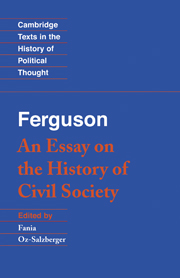Book contents
- Frontmatter
- Contents
- Introduction
- Chronology of Ferguson's life
- Biographical notes
- Bibliographical guide
- A note on the text
- Acknowledgements
- An Essay on the History of Civil Society
- Contents
- PART I Of the General Characteristics of Human Nature
- PART II Of the History of Rude Nations
- PART III Of the History of Policy and Arts
- PART IV Of Consequences that result from the Advancement of Civil and Commercial arts
- PART V Of the Decline of Nations
- PART VI Of Corruption and Political Slavery
- List of variants
- Index
- Title in the series
PART IV - Of Consequences that result from the Advancement of Civil and Commercial arts
Published online by Cambridge University Press: 05 June 2012
- Frontmatter
- Contents
- Introduction
- Chronology of Ferguson's life
- Biographical notes
- Bibliographical guide
- A note on the text
- Acknowledgements
- An Essay on the History of Civil Society
- Contents
- PART I Of the General Characteristics of Human Nature
- PART II Of the History of Rude Nations
- PART III Of the History of Policy and Arts
- PART IV Of Consequences that result from the Advancement of Civil and Commercial arts
- PART V Of the Decline of Nations
- PART VI Of Corruption and Political Slavery
- List of variants
- Index
- Title in the series
Summary
Of the Separation of Arts and Professions
It is evident, that, however urged by a sense of necessity, and a desire of convenience, or favoured by any advantages of situation and policy, a people can make no great progress in cultivating the arts of life, until they have separated, and committed to different persons, the several tasks, which require a peculiar skill and attention. The savage, or the barbarian, who must build and plant, and fabricate for himself, prefers, in the interval of great alarms and fatigues, the enjoyments of sloth to the improvement of his fortune: he is, perhaps, by the diversity of his wants, discouraged from industry; or, by his divided attention, prevented from acquiring skill in the management of any particular subject.
The enjoyment of peace, however, and the prospect of being able to exchange one commodity for another, turns, by degrees, the hunter and the warrior into a tradesman and a merchant. The accidents which distribute the means of subsistence unequally, inclination, and favourable opportunities, assign the different occupations of men; and a sense of utility leads them, without end, to subdivide their professions.
The artist finds, that the more he can confine his attention to a particular part of any work, his productions are the more perfect, and grow under his hands in the greater quantities.
- Type
- Chapter
- Information
- Ferguson: An Essay on the History of Civil Society , pp. 172 - 193Publisher: Cambridge University PressPrint publication year: 1996



